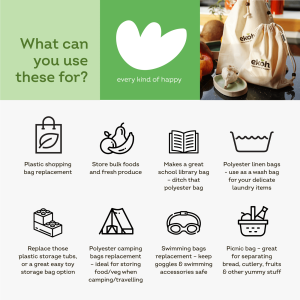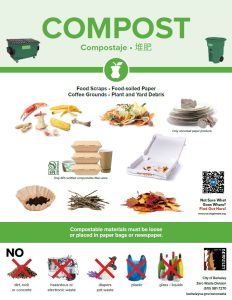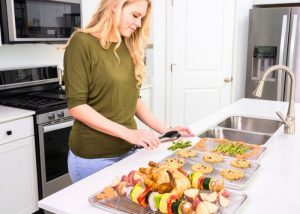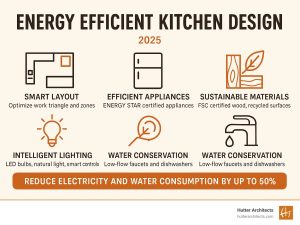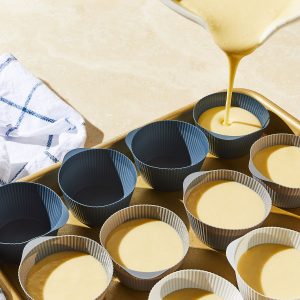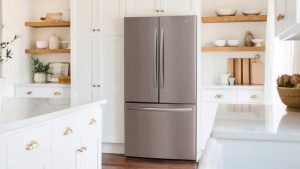Your kitchen can be one of the biggest energy users in your home, but cutting down on that usage doesn’t have to be hard. Imagine lowering your energy bills while still enjoying your favorite meals and keeping your kitchen running smoothly.
You’ll discover simple, practical steps that make a real difference. These easy changes can save you money and help the environment—without any extra hassle. Ready to take control of your kitchen’s energy use? Keep reading to find out how.
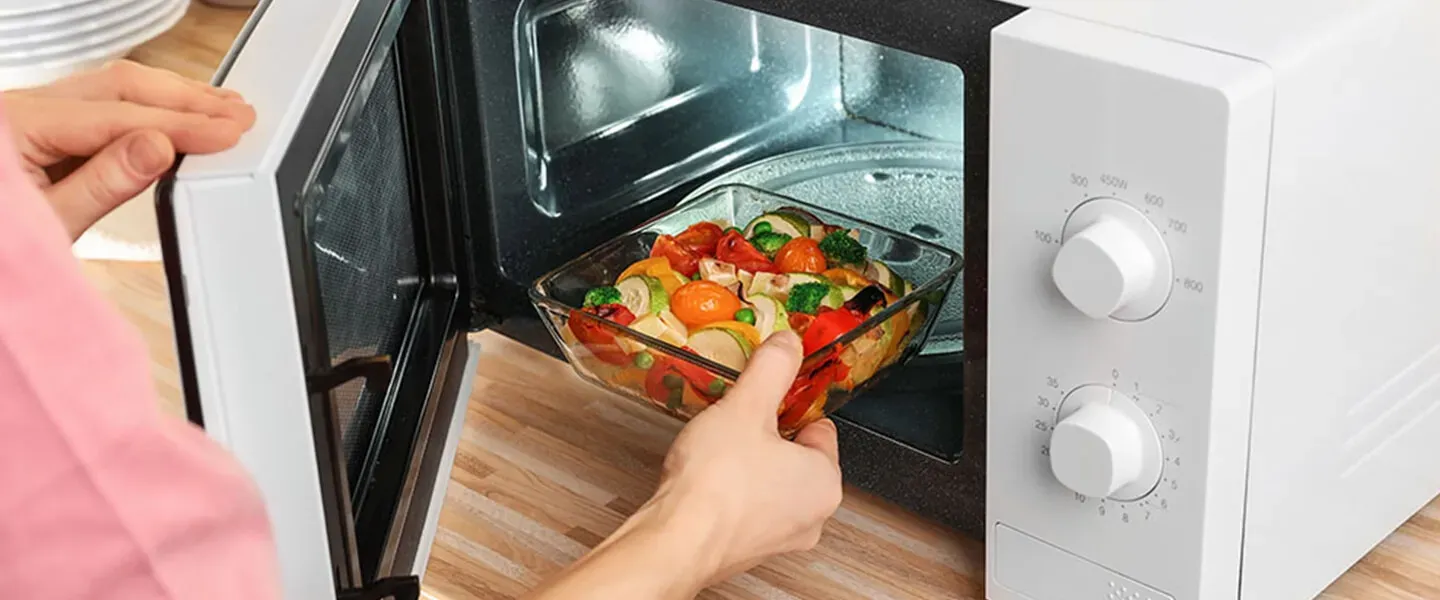
Credit: www.woodcocks.us
Cut Appliance Energy Use
Reducing energy use in the kitchen saves money and helps the environment. Focus on cutting energy from appliances.
Small changes in how you use kitchen devices can make a big difference. Let’s explore some effective methods.
Choose Energy-efficient Models
When buying new kitchen appliances, look for energy-efficient models. These appliances use less electricity and water.
Check for energy ratings and choose models with higher efficiency. They save more energy over time.
- Look for Energy Star labels
- Compare energy usage before buying
- Consider long-term savings, not just price
Unplug Devices When Idle
Many kitchen gadgets still use power when not in use. Unplug them to save energy.
Devices like toasters and microwaves draw energy even when turned off. Unplugging them helps reduce this waste.
- Unplug coffee makers after use
- Disconnect chargers when not in use
- Use power strips for easy unplugging
Optimize Fridge And Freezer Settings
Proper settings on your fridge and freezer can cut energy use. Keep fridge temperature between 35-38°F.
Freezer should be set at 0°F for efficiency. Avoid overloading them, as this makes them work harder.
- Check seals for tightness
- Defrost regularly to maintain efficiency
- Organize items for better airflow
Cook Smartly
Using less energy in the kitchen helps save money and the environment. Cooking smartly is an easy way to cut energy use.
Small changes in how you cook can reduce electricity or gas bills. Learn simple tips to cook smart and save energy.
Use Lids To Save Heat
Cover pots and pans with lids while cooking. This keeps heat inside and cooks food faster.
Using lids reduces energy needed to keep food hot. It also stops water from evaporating, which saves time.
Batch Cook And Reheat
Cook large amounts of food at once. Reheat leftovers instead of cooking new meals every time.
This method uses less energy than cooking many small meals. It also saves time and reduces kitchen heat.
Use Microwave Or Toaster Oven
Microwaves and toaster ovens use less energy than large ovens. They heat food quickly and keep energy use low.
Use these appliances for small meals or reheating. They help cut down cooking time and energy costs.
Improve Lighting
Lighting uses a lot of energy in the kitchen. Simple changes can lower your energy use.
Better lighting helps save money and makes the kitchen comfortable to work in.
Switch To Led Bulbs
LED bulbs use less energy than regular bulbs. They last much longer too.
Changing all kitchen lights to LED can cut your electricity use for lighting by up to 80%.
- Use LED bulbs with the right brightness for your kitchen
- Choose warm white LEDs for a cozy feel
- Turn off lights when not in use
Maximize Natural Light
Natural light reduces the need for electric lights during the day. Open curtains or blinds to let sunlight in.
Keep windows clean to let in the most light. Arrange your kitchen so work areas get more sunlight.
- Place your workspaces near windows
- Use light-colored walls and surfaces to reflect light
- Avoid blocking windows with furniture or curtains

Credit: www.aepenergy.com
Maintain Kitchen Equipment
Keeping your kitchen equipment in good shape helps save energy. Well-maintained appliances use less power.
Simple care routines improve appliance efficiency and lower your electricity bills.
Clean Appliances Regularly
Dirty appliances work harder and use more energy. Cleaning removes dust and grime that block airflow.
Wipe down the outside and clean inside parts like coils and filters for better performance.
- Clean refrigerator coils every six months
- Remove lint from dryer filters after each use
- Clear grease from stove and oven surfaces
- Descale kettles and coffee machines regularly
Check Seals And Insulation
Broken seals let warm or cold air escape. This makes your fridge and oven use more energy.
Inspect seals on doors and replace damaged ones. Good insulation keeps temperatures steady.
- Test refrigerator door seals with a piece of paper
- Replace cracked or torn oven door gaskets
- Check insulation around water heaters and pipes
- Seal gaps around kitchen windows and doors
Manage Water Heating
Water heating uses a lot of energy in the kitchen. Managing it well helps cut energy bills.
Simple changes can reduce how much hot water you use every day.
Use Cold Water When Possible
Cold water uses no energy to heat. Use it for tasks that do not need hot water.
Examples include washing fruits, rinsing dishes, and filling pots for boiling.
- Wash hands with cold water when possible
- Use cold water for quick rinses
- Fill the kettle with cold water before heating
- Save hot water for cooking and cleaning only
Fix Leaks Promptly
Leaking taps waste hot water and energy. Fix leaks quickly to save both.
Even small drips add up to big energy loss over time.
- Check taps and pipes regularly for leaks
- Replace worn washers or seals to stop drips
- Call a plumber if you cannot fix the leak
- Fix leaks to reduce water and heating costs
Adopt Energy-saving Habits
Saving energy in the kitchen helps reduce bills and protect the environment. Simple habits can make a big difference every day.
By changing how you use lights and appliances, you use less power and waste less food. This saves energy and money.
Turn Off Lights And Appliances
Always switch off lights when you leave the kitchen. Lights use energy even if you are not using the room.
Unplug small appliances like toasters and coffee makers if you do not use them often. They still use power when plugged in.
- Turn off overhead lights when not needed
- Use natural light during the day
- Unplug appliances after use
- Use energy-saving bulbs
Plan Meals To Reduce Waste
Plan your meals before shopping. Buy only what you need to avoid throwing away food.
Use leftovers to make new meals. This reduces waste and saves energy used in cooking.
- Create a weekly meal plan
- Check your fridge before buying food
- Store food properly to keep it fresh
- Use leftovers creatively
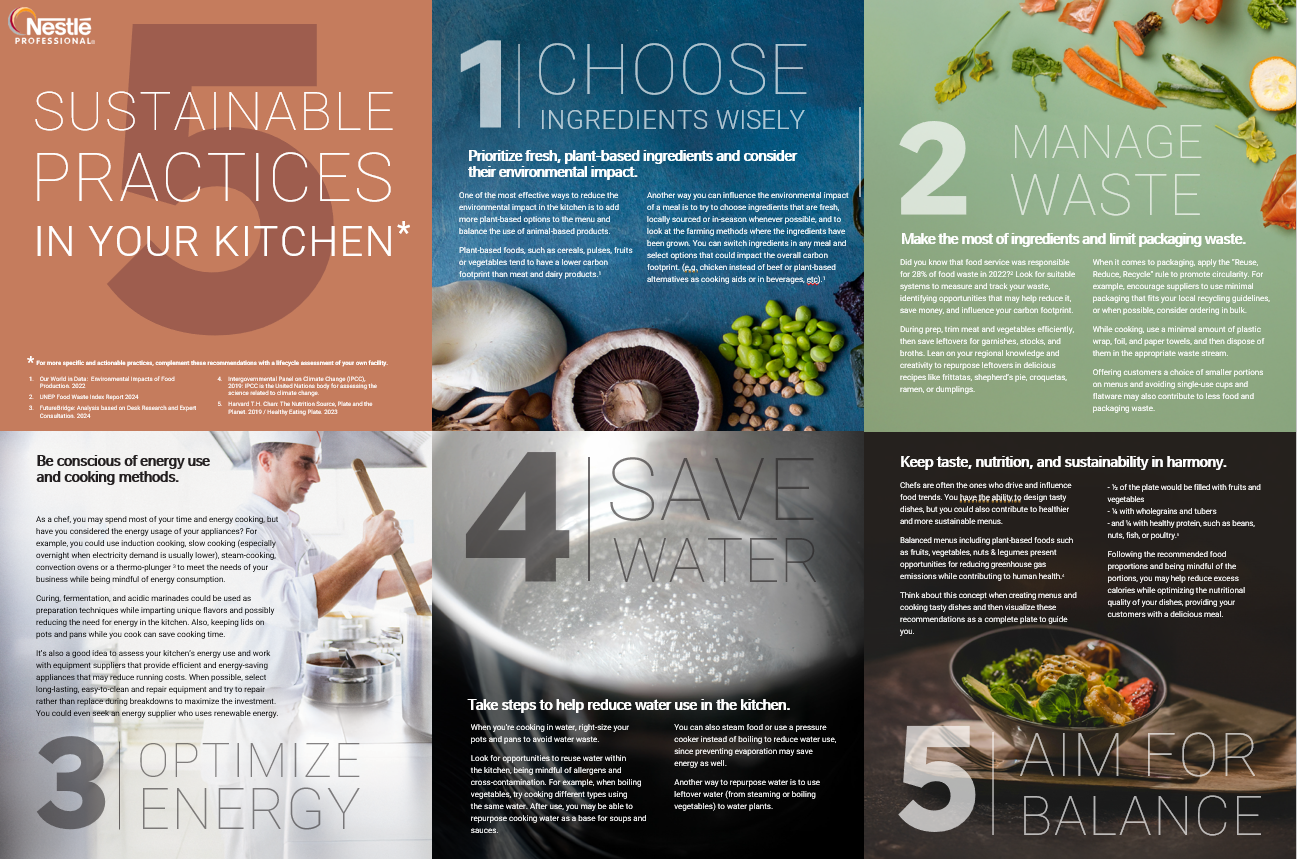
Credit: www.nestleprofessional.com
Frequently Asked Questions
How Can I Save Energy When Using Kitchen Appliances?
Use energy-efficient appliances and unplug devices when not in use. Cook with lids on pots to reduce heat loss. Avoid preheating ovens unnecessarily and use microwaves for smaller meals to save energy.
What Cooking Habits Reduce Kitchen Energy Consumption?
Use pressure cookers and slow cookers to save energy. Batch cook meals to minimize oven use. Defrost food in the fridge instead of using a microwave. Turn off appliances immediately after cooking.
How Does Lighting Impact Kitchen Energy Usage?
Switch to LED bulbs in the kitchen for energy efficiency. Use natural daylight whenever possible to reduce artificial lighting needs. Turn off lights when the kitchen is not in use to save electricity.
Are There Energy-saving Tips For Kitchen Refrigeration?
Keep fridge temperature between 37-40°F (3-4°C) and freezer at 0°F (-18°C). Avoid frequent door opening to maintain temperature. Clean coils regularly to improve efficiency. Don’t overload the fridge for better air circulation.
Conclusion
Saving energy in the kitchen helps lower your bills and protect the planet. Small changes add up to big savings over time. Turning off appliances when not in use makes a difference. Using energy-efficient tools also cuts power use. Cooking smart, like using lids and batch cooking, saves energy too.
Everyone can take steps to reduce kitchen energy. Start today and enjoy a greener, cheaper kitchen tomorrow. Simple habits lead to lasting results. Why wait? Make your kitchen energy-smart now.

